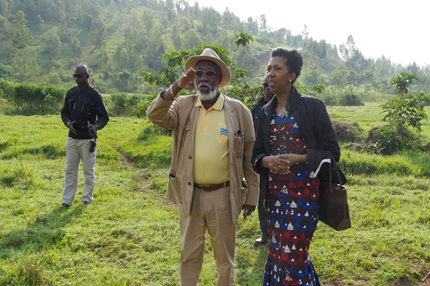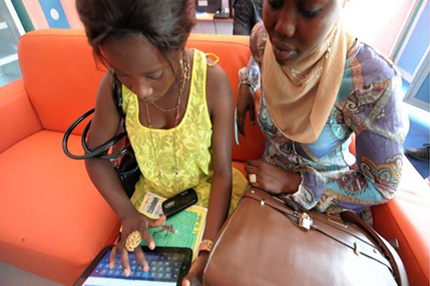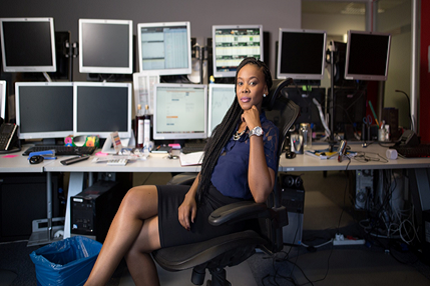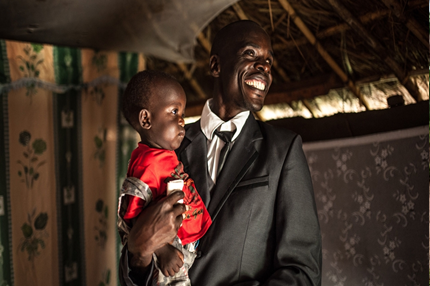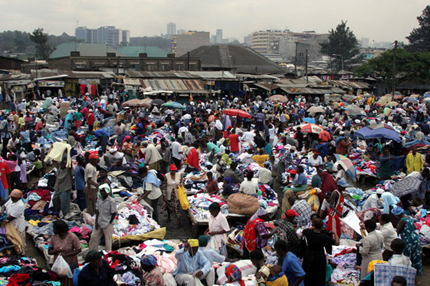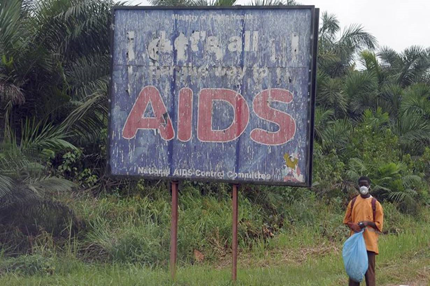Congolese rape survivor finds justice elusive: ‘I'm afraid my father will find me’
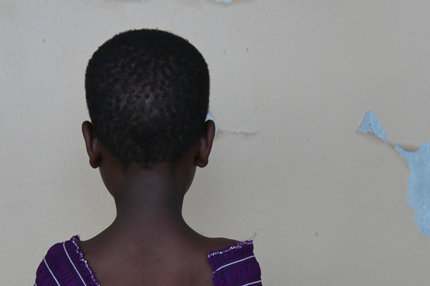
Eve, a rape survivor who has fought for justice in DRC, where thousands of girls and women are raped each year. Photograph: Ruth Maclean
Eve was repeatedly raped by her father. Her long, lonely battle for redress exposes deep flaws in the Democratic Republic of the Congo’s legal framework
For a few years, Eve’s father carried on raping her intermittently. Then, one day, he told Eve he was taking her back to his home to go to school. The rapes became much more frequent.
When Eve* walked into the courtroom to face her father, who had raped her since she was 13, his family was waiting. As she made her way to her seat, they got up and stood in her path. They scratched her, yanked her long hair back, and hit her.
A relative, Lydia*, who had also been repeatedly raped by Eve’s father, had agreed to testify on her behalf. That gave her courage.
When it was Eve’s turn to give evidence, her father’s relatives – who were her relatives too, but were there to support the richer, more powerful party to the case – began to shout over her. “They were yelling at me, insulting me,” she said. “The lawyers had to calm them down.” Finally, they were brought to order and Eve was able to tell the court her story.
The first time her father raped her she had not met him many times. Until that point, Eve had lived with another relative in the Democratic Republic of the Congo (DRC). Eve’s family were not well-off, but she was a happy little girl. Then, her father came back.
“It started with [Lydia],” she said. “She told me she had to have sex with [my father] and I had to do it too, and he would give us everything we wanted. I was scared. They did it in front of me. When they finished, my father started touching me. I was very scared and felt weak. He made me lie on the bed and began doing that to me. I started bleeding.” That was the beginning of an ordeal that would go on for five years.
Women's rights and gender equality, we highlights issues affecting women, girls and transgender people.


Thousands of girls and women are raped each year in DRC. In the east, a region that has been at war on and off since 1996, many of the rapists are armed rebels, soldiers and police officers, using sexual violence as a weapon to keep local communities subdued.
Respect for elders, however, is still a cornerstone of Congolese society. So Eve was unusual in that she stood up to her father from the beginning. “I asked him: ‘Why do you do this to your own daughter?’ He said he was scared of catching diseases from other girls. I told him I would tell [someone]. He ordered me not to, and he bought [me and Lydia] phones and clothes.”
For a few years, Eve’s father carried on raping her intermittently. Then, one day, he told Eve he was taking her back to his home to go to school. The rapes became much more frequent.
“If I could find a way to escape, I would, but if not, he just did it,” she said. “It carried on like that. Then, one day, I said I couldn’t continue. When I refused he would beat me. People wondered why he beat me so much.”
Eve thought about trying to tell her relatives, but something happened that made her change her mind. Her father was raping another young relative, who told her family what had happened. “They talked about it,” Eve said. “But then they calmed things down and blamed my [relative], not my father, because she was younger.”
Women and girls are often blamed for “seducing” their rapists. In a recent survey (pdf), more than 80% of men and women thought that some women “ask to be raped” by the way they dressed or behaved. Very often, rape survivors are abandoned by their families, which in the Congolese context of poverty and war, where family and community are the only support systems, means they are left to starve.
Escape finally came when Eve’s father beat her in public. A staff member at her school noticed her crying and, after years of abuse, Eve told someone her story.
Her father was arrested and imprisoned and Eve had to decide whether to press charges. Despite getting no support from her family, she decided to take him to court.
The country’s legal framework has been strengthened in recent years, but the system is notoriously ineffective. Officials are paid off, and a weak jail system means many prisoners escape or pay their way out.
Successful prosecutions are few and far between. Most sexual violence survivors do not even try to pursue their rapists through the courts, according to Julienne Lusenge, a grassroots women’s rights activist who founded Sofepadi, an organisation that helps rape survivors. “Not all women go to the authorities,” she said. “Some women come for medical help. Others don’t come at all. They don’t think it’s worth it because it takes so long and there aren’t any reparations, and they risk being ostracised by their families and societies.”
According to Lusenge, some people live hundreds of kilometres from their nearest court. Mobile hearings, where a court visits a village for a few days to hear local cases out in the open – so that villagers see justice working in person and witness their neighbours being publicly punished – have been shown to work well.
“It’s not just about sentencing, it’s about education,” said Charles-Guy Makongo, director of the American Bar Association (ABA) in DRC. “It creates positive fear in a community, where people will understand they’re not allowed to rape.” But mobile hearings are difficult to organise and expensive. Moreover, because they are funded by NGOs and the UN rather than the government, they are not sustainable.
There is no such thing as legal aid, and bringing a case costs upwards of $300 (£240) – an unimaginable sum for women unable to afford $10 for a sack of flour.
Amid these obstacles to justice, impunity reigns.
Eve was fortunate that the magistrate referred her to the ABA, which provided a lawyer. The ABA is one of a few organisations helping rape survivors to get justice in the DRC. It has provided legal counsel to roughly 21,500 survivors, of whom about half have filed cases. Of these, about 2,000 have gone to trial, with 1,300 convictions so far.
While Eve’s testimony was powerful, her father’s was weak: he often contradicted himself, denying things he had already admitted to the magistrate. She felt sure she would win. She knew not to hope for reparations, as they are seldom paid in DRC. But she hoped to be able to get on with her life. She dreamed of training to be a lawyer, and helping other girls in her position.
The trial proceedings ended, but there was no verdict. For months she heard nothing, and presumed her father was still in prison. She then got a phone call from her father. “Wherever you are, I will kill you,” he said.
The ABA told her he had been acquitted. He may have paid off court officials.
“I’m disappointed with the Congolese justice system,” Eve said. “My case was a clear case. I can’t understand how he got out of prison. Instead of giving rights to the person who needs it, they give them to the person in the wrong – to the rapist.”
Nadine Saiba, a lawyer at the ABA, agreed: “We have stories upon stories, but this one just revolts you. All this for money.”
Receiving this blow after a long, lonely fight for justice made Eve even more determined to become a lawyer. “Seeing the work the ABA has done for me, I want to do it for others,” she said.
A local organisation is considering giving her a bursary to study law. Even if the bursary comes through, though, it will not cover the cost of the first year, which at roughly $1,500, would be unaffordable for Eve, who has gone into hiding. “I know I am a strong woman,” she said. “I told my secret because I had courage. But I am still afraid that my father will come back and find me.”
He has fled abroad, but she believes that one day, he will be brought to justice. “Even if he denies it now, one day he’ll accept his crime, that he did these things. The ABA will support me and it will end. It can’t stay like this. I have confidence in the God I pray to.”
*Names changed to protect identities

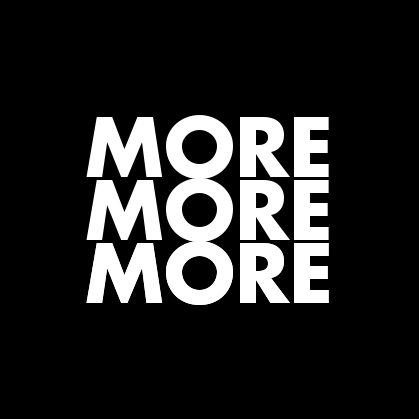
YOU MAY ALSO
LIKE:...
GREAT DEALS FOR
YOU:...

SUGGESTED FOR
YOU

SPONSORED CONTENT


YOUR SHOPPING MADE EASY
Africa's Change Makers Magazine
COMPANY
AFRICAN ACHIEVERS INTERNATIONAL Inc. is a global media and technology company including lifestyle media publisher SEMA AFRICA
online
Magazine AFRICAN ACHIEVERS MAGAZINE, digital shopping
platform PA-BEAUTY STATION.COM, event management
PRIDE OF AFRICA, awards program AfIA
AWARDS, youth and talent development, PILLARS OF
HOPE and AAK, Volunteerism
UNIVERSIDAY grassroots community support
NAD and financial support
REMITGROW and monthly subscription box AAi Must
Have. ....
More from African Achievers International
SUBSCRIBE









